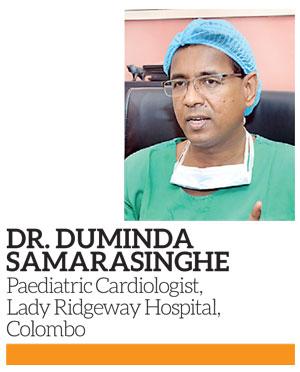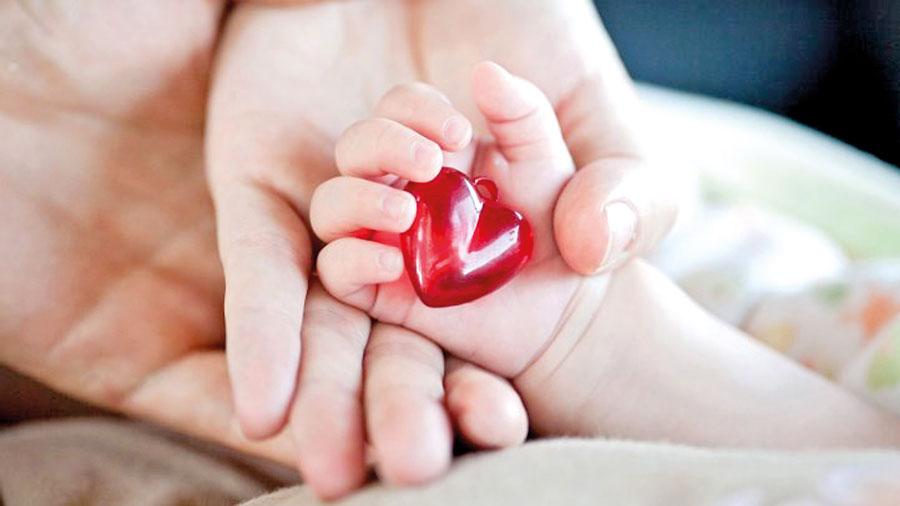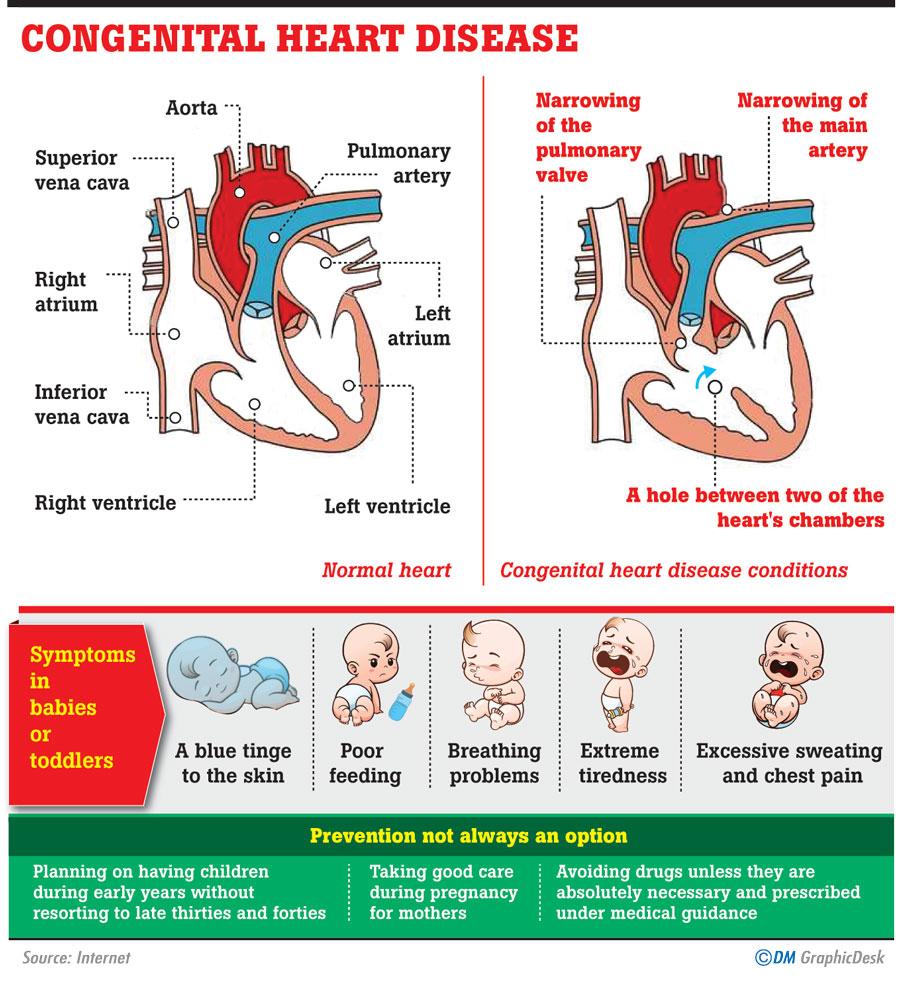22 Feb 2019 - {{hitsCtrl.values.hits}}

 The period that fell in February between 7-14 was dedicated to congenital heart disease. A special effort is taken during these days in raising awareness among the public regarding this condition.
The period that fell in February between 7-14 was dedicated to congenital heart disease. A special effort is taken during these days in raising awareness among the public regarding this condition.
The fact that young lives get affected by this malady is why more focus should be directed towards congenital heart diseases. Most of the diseases that people have to deal with arise with age.
Therefore prevention is a valid consideration. However prevention is not an option in the subject of congenital diseases because these diseases occur from birth and are beyond human control. The interview done with Dr. Duminda Samarasinghe, Paediatric Cardiologist, Lady Ridgeway hospital, Colombo sheds light on common questions posed by the public on the topic of congenital heart diseases.
“Congenital heart diseases are heart diseases that arise from birth. It is estimated that approximately 3000 newborns every year suffer from this condition. 6-8 out of every 1000 newborns would have heart diseases,” stated Dr. Samarasinghe.
As these heart diseases are caused during the foetal formation stage within the mother’s womb, there is actually no way of preventing a congenital heart disease or any congenital condition in general
With new and improved met hods in modern medicine the diagnostic methods have improved which is why more of these cases are being detected and therefore being treated early. Speaking on what leads to causing congenital heart diseases, Dr. Samarasinghe mentioned that 90-95% of the time there are no causes. The heart is a complex and a very active organ with valves and chambers. The child is born with a defect in the heart which has occurred as a result of a malformation of the heart during its development in its foetal stages.
hods in modern medicine the diagnostic methods have improved which is why more of these cases are being detected and therefore being treated early. Speaking on what leads to causing congenital heart diseases, Dr. Samarasinghe mentioned that 90-95% of the time there are no causes. The heart is a complex and a very active organ with valves and chambers. The child is born with a defect in the heart which has occurred as a result of a malformation of the heart during its development in its foetal stages.
“The remaining 5-10% of the cases has some causative factor. 40% of children born with Down’s syndrome are born with heart diseases and are heart patients.
When parents marry at an older age- above 35 years- and have children late in their marriage after delaying child birth, there is a higher risk of giving birth to children with congenital heart disease. Drugs, alcohol intake as well as smoking during pregnancy puts the mother under greater risk when giving birth to children. Such newborns are likely to suffer from congenital heart disease. Uncontrolled diabetes of the mother is another reason,” Dr. Samarasinghe explained.
Early diagnosis is important and will help in receiving early treatment. This is done by conducting a thorough examination of the patient. When an abnormal murmur of the heart is detected as opposed to the normal heart beat, the patient is directed towards an echocardiogram which is the main method of diagnosing a congenital heart condition. “An echocardiogram alone is responsible for detecting heart complications 99.9% of the time. Prior to an echocardiogram, tests like x-rays and ECGs could also be conducted,” he informed.

Symptoms like laboured beathing of the child, when fed, should warn parents to direct their children for medical attention with regard to congenital heart disease. “They are unable to feed for a longer period. Babies may appear blue in colour, children may suffer from poor weight gain, there may be sweating of the head as well as the presenting of recurring chest infections; these are some of the warning signs.
It is estimated that approximately 3000 newborns every year suffer from this condition. 6-8 out of every 1000 newborns would have heart diseases
According to Dr. Samarasinghe, one third of the congenital heart diseases have no treatment. They could be very minor lesions such as a mild narrowing of the valves. “These issues may resolve on their own or the defect may not have an adverse impact on the patient’s life. They are able to live with the defect without consequences. It’s very rare that the condition can be too complex for treatment, but children presenting with this condition fall under 1%,” he asserted. The remaining two third of patients with heart complications require treatment. “Treatments are classified into 3 groups; the first being medical treatment which is just a bridging therapy until a more serious form of treatment is commenced. Medical treatment is not a long-term option and is initiated to control the symptoms until the other forms of treatments are approached. These include either catheter-based intervention or surgery. In a catheter- based treatment, the chest is not opened up. Instead the correction of the defect such as the closing up a hole or the opening up of a valve is done using a catheter which is passed through a blood vessel,” Dr. Samarasinghe elaborated.
Whether the patient has to resort to catheter-based treatment or surgery depends on the condition of the patient. A child heart surgery would last for about 4-6 hours.

As these heart diseases are caused during the foetal formation stage within the mother’s womb, there is actually no way of preventing a congenital heart disease or any congenital condition in general.However attention could be paid to details such as preventing late marriages and delayed pregnancies. The older a woman gets to bear children, the more likely the child will be susceptible to congenital heart conditions. In addition, mothers who have not approached treatment for heart disease should be aware and seek medical help as this could impose a threat to both the mother and the life of the unborn child. Also avoiding smoking and alcohol, especially during pregnancy, is quite important. Pregnant mothers should also pay attention to other disease conditions such as diabetes, etc. and obtain treatment. Leaving medical conditions untreated especially during pregnancy can cause dangers to both the mother as well as the unborn child.
“It is necessary for the public to be more aware of this condition and come forward in playing their part to raise awareness. A noble cause and effort is being made under the programme ‘Little hearts project’ which raises funds to build a 12-storey building with improved and better facilities, so that not only children with heart conditions, but also children suffering from other critical illnesses can seek treatment. By contributing towards this cause, it will ensure that 10,000 more young innocent lives can be saved every year,” concluded Dr. Samarasinghe. He invites the public to lend a hand in achieving the target of the fund raiser as it is quite clear that many lives of children can be saved every year.
Contributions can be made to the Little Hearts Project account number:79738633 at BOC Borella branch
Log onto www.littlehearts.com for online contributions and more details.
22 Dec 2024 44 minute ago
22 Dec 2024 1 hours ago
22 Dec 2024 1 hours ago
22 Dec 2024 6 hours ago
22 Dec 2024 7 hours ago